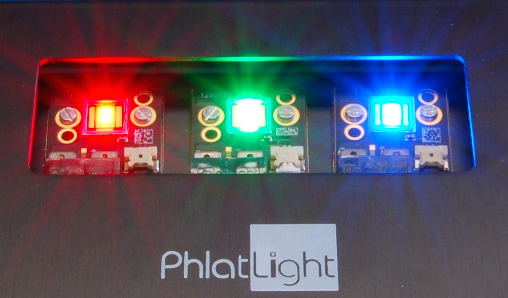IMHO, PhlatLight LEDs from Luminus are pretty phat

LED screens in notebooks are becoming fairly common, if not standard, not just because of the energy issues but because people are craving smaller, lighter laptops. But what about an LED in your HDTV?
Enter Luminus Devices of Billerica, Mass., which has developed an LED chip based on patented Photonic Lattice (PhlatLight) technology that can be used as an option to replace arc lamps in some of the larger DLP projection systems that are currently hitting the market. (The technology came out of the Massachusetts Institute of Technology.)
Here's a photo of the LED chips, running at about 1 percent of their illumination potential.
The company's founder and CTO Alexei Erchak touts the technology as bright enough and low-powered enough to handle the special needs of the the large-screen format. Typical LEDs can't illuminate these screens brightly enough to do the job, but by placing PhlatLight LEDs around the edge of the screen, the technology can provide enough light for the entire system, according to Erchak. (It would take roughly 10 of the Luminus LEDs to illuminate a 50-inch system.) Another bonus: Not only does the technology skip the mercury you'd find in older televisions, but the LEDs will last longer than the bulbs you'd find in most DLP systems, according to Luminus executives.
The Luminus technology is being used in about 100,000 DLP TVs that have been sold over the last couple of years and the company counts Samsung, LG, Sony and Sharp among its OEM customers. Last month, Texas Instruments and Luminus demonstrated 1080p prototype home theater projection system using the technology. Products based on that work are due out in 2009, but several home theater projection products are due later this year.
So, if you're in the market for an HDTV, consider how green you can be.
